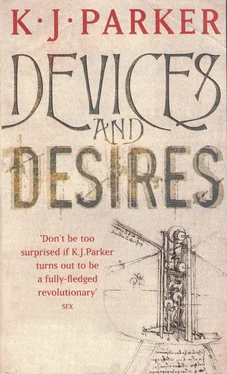K Parker - Devices and Desires
Здесь есть возможность читать онлайн «K Parker - Devices and Desires» весь текст электронной книги совершенно бесплатно (целиком полную версию без сокращений). В некоторых случаях можно слушать аудио, скачать через торрент в формате fb2 и присутствует краткое содержание. Жанр: Фэнтези, на английском языке. Описание произведения, (предисловие) а так же отзывы посетителей доступны на портале библиотеки ЛибКат.
- Название:Devices and Desires
- Автор:
- Жанр:
- Год:неизвестен
- ISBN:нет данных
- Рейтинг книги:3 / 5. Голосов: 1
-
Избранное:Добавить в избранное
- Отзывы:
-
Ваша оценка:
- 60
- 1
- 2
- 3
- 4
- 5
Devices and Desires: краткое содержание, описание и аннотация
Предлагаем к чтению аннотацию, описание, краткое содержание или предисловие (зависит от того, что написал сам автор книги «Devices and Desires»). Если вы не нашли необходимую информацию о книге — напишите в комментариях, мы постараемся отыскать её.
Devices and Desires — читать онлайн бесплатно полную книгу (весь текст) целиком
Ниже представлен текст книги, разбитый по страницам. Система сохранения места последней прочитанной страницы, позволяет с удобством читать онлайн бесплатно книгу «Devices and Desires», без необходимости каждый раз заново искать на чём Вы остановились. Поставьте закладку, и сможете в любой момент перейти на страницу, на которой закончили чтение.
Интервал:
Закладка:
That seemed to cover the situation pretty well, though Orsea felt he ought to be asking penetrating questions to display his perfect grasp of it. But the only thing he really wanted to know was whether, at some point between now and the start of the actual assault, Jarnac would be slipping off home to change into something else; or whether he'd got a full wardrobe of different armours laid out ready in the guard tower. He wished he didn't dislike Jarnac so much, particularly since he was going to have to rely on him; that made him think of Miel, which had the effect of freezing his mind. 'Carry on,' he heard himself say.
He toured the walls, of course, and anxious-looking officers whose names tended to elude him jumped up and saluted him wherever he went. They pointed things out to him, things he couldn't quite make out in the distance-high points where the enemy might put observers or long-range engines, patches of dead ground where a whole division could lurk unseen, secret mountain trails that could be useful for raids and sorties-and he knew that he ought to be taking it all in, building each component into a mechanism that would serve as a weapon against the enemy. But there was too much of everything for his mind to grasp. The only thing he knew for certain was that he was slowly seizing up, as fear, shock and pain coagulated and set inside him. The enemy would build their platform and their engines would grind down the walls at their leisure, smashing Vaatzes' hard-earned, expensive scorpions into rubbish before they'd had a chance to loose a single shot. When that task had been completed to their perfect satisfaction, the enemy would advance, entirely safe, to the foot of the wall; their scorpions would clear away the last of Jarnac's defenders, the ladders would be raised, the enemy would surge in like a mighty white-fringed wave; and all the while, Miel (who could have saved the city) would watch from his tower window, and Veatriz would watch from hers; maybe they'd be watching when he was killed, maybe they'd see him fall and be unable to do anything…
Part of the torment was knowing that there was still enough time. He could send a runner to the captain of the East Tower; Miel could be here beside him in a few minutes, to forgive him and take over and make everything all right again. But he couldn't do that; because Miel had betrayed him, Miel and Veatriz-the truth was that he didn't know what it was they'd done, or how Duke Valens came into it; all he knew was that he could never trust either of them again, and without them he was completely useless, a fool in charge of the battle of life against death. It was like the nightmares he had now and again, where he was a doctor about to perform surgery, and he suddenly realised he didn't have the faintest idea what he was supposed to do; or he'd agreed to act in a play but he hadn't got round to learning his lines, and now he was due to go on in front of a hundred people. The officers carried on telling him things he ought to know, but it was as though they were speaking a foreign language. We've had it, he thought; and his mind started to fill up with images of the last time, the field of dead men and scorpion bolts. It's all my fault, he told himself, I'm to blame for all of it; nobody else but me.
Once the tour of inspection was over, he went back to Jarnac's tower and asked him what was happening. Jarnac pointed out the heavy engines-he could see them for himself now-being dragged up the slope by long trains of mules. Ahead of them trudged a dense mass of men; the work details, Jarnac explained, who'd be building the platform for the engines.
'I see,' Orsea said. 'So what should we be doing?' He could see a flicker of concern in Jarnac's eyes, as if to say what're you asking me for? 'Well,' he said, 'as I mentioned earlier, we have the option of launching a sortie. We can try and drive off the work details, or kill them, or capture or destroy the heavy engines. It's our only way of putting the engines out of action before they neutralise our defences-assuming, of course, that they're capable of doing that. We've never seen them in action, or heard any accounts of what they can do, so we're guessing, basically. But if we launch the sortie, we'll be taking quite a risk. To put it bluntly, I don't think we'd stand any more of a chance than we did the last time we took on the Mezentines in the open. Our scorpions can't give us cover down there, and we'd be walking right up to theirs; and even if you leave the scorpions out of it completely, we'd be taking on their army in a pitched battle. I don't think that'd be a good idea.'
Jarnac stopped talking and looked at him; so did a dozen or so other officers, waiting for him to decide. He could feel fear coming to life inside them (the Duke hasn't got a plan, he can't make up his mind, he's useless, we're screwed). He knew he had to say something, and that if he said the wrong thing it could easily mean the destruction of the city.
'Fine,' he said. 'No sortie. We'll just sit it out and wait and see.'
The silence was uncomfortable, as though he'd just said something crass and tactless, or spouted gibberish at them. I've lost them, he thought, but they'll obey my orders because I'm the Duke. Their excellent loyalty would keep them from ignoring him and doing what they thought should be done, what they knew was the right course of action; they'd fail him by loyalty, just as Miel had failed him by treachery. Ah, symmetry!
But he'd given the order now; fatal to change his mind and trample down what little confidence in him they had left. Amusing thought: here was the entire Mezentine army coming up the mountain specially to kill him, well over thirty thousand men all hungering for his blood; even so, in spite of their multitudes, he was still his own worst enemy.
Jarnac cleared his throat. 'If it's all right with you, I'd like to run the scorpion crews through a few more drills,' he said. 'We've got time, I'm fairly sure, and-'
'Yes, do that,' Orsea snapped at him. 'I'll get out of your way, you've got-' He didn't bother to finish the sentence. He headed for the stairs. People followed him; he ought to know who they all were, but he didn't. He had no clear idea of where he was going, or what he was going to do next.
In response to his urgent request for technical advice, they brought him a man called Falier, who was apparently the chief engineer of the state arms factory. It seemed logical enough. This Falier was in charge of building the machines, so presumably he'd know how they worked and what they were capable of doing.
Falier turned out to be younger than he'd expected; a nervous, good-looking, weak sort of man who'd probably agree with everything he said. General Melancton sighed, told him to sit down and offered him a drink.
'The heavy engines,' he said. 'The-what are they, the Mark Sixes. How far will they shoot?'
The man called Falier looked at him as if he didn't understand the question. 'Well,' he said slowly, 'it all depends. I mean, for a start, how heavy a ball are you using?'
Expect the worst of people and you won't be disappointed. 'I don't know,' Melancton said with studied patience. 'You tell me. What weight of ball will give me maximum range?'
Falier was doing sums in his head. 'A two-hundredweight ball will carry six hundred yards,' he said, 'at optimum elevation, assuming the wind's not against you. But,' he went on, 'I can't guarantee it'd be effective against that sort of masonry; not at extreme range.'
'I see.' Melancton sighed. 'So what weight of ball do I need to use?'
'Well,' Falier said, 'a five hundredweight'll go through pretty much anything.'
'Excellent. And what's the extreme range of a five hundredweight?'
Falier shrugged. 'Two hundred yards,' he said. 'More if you've got a following wind, of course.'
Читать дальшеИнтервал:
Закладка:
Похожие книги на «Devices and Desires»
Представляем Вашему вниманию похожие книги на «Devices and Desires» списком для выбора. Мы отобрали схожую по названию и смыслу литературу в надежде предоставить читателям больше вариантов отыскать новые, интересные, ещё непрочитанные произведения.
Обсуждение, отзывы о книге «Devices and Desires» и просто собственные мнения читателей. Оставьте ваши комментарии, напишите, что Вы думаете о произведении, его смысле или главных героях. Укажите что конкретно понравилось, а что нет, и почему Вы так считаете.












